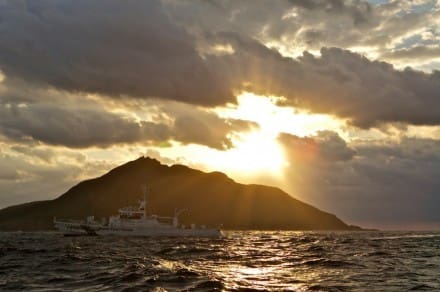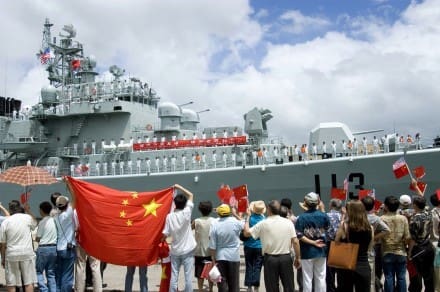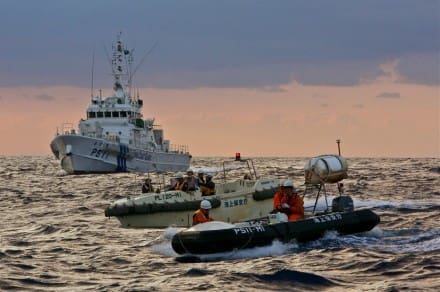Two massive American B-52 bombers sailed calmly through the skies above the East China Sea. Below, three islands sit in the waters between Japan and China and which side of the border they lie on is hotly disputed. On November 23, China announced that it had annexed the airspace above the islands and would require all planes flying through it to file a flight plan with Beijing. Three days later, the unarmed U.S. planes passed through the airspace without incident as tensions continue to ratchet up.
“We view this development as a destabilizing attempt to alter the status quo in the region,” U.S. Secretary of Defense Chuck Hagel said in response to the Chinese statement, reports Bloomberg. “This unilateral action increases the risk of misunderstanding and miscalculations.”
China’s extension of its sovereign airspace over the disputed islands is merely the latest development in a series of escalating incidents between the two Asian powers. The currently uninhabited islands, known as Diaoyu in Chinese and Senkaku in Japanese, lie northeast of Taiwan in a region where the exclusive economic zones of each country overlap. According to the BBC, the surrounding seafloor is home to extensive oil and gas reserves.
The United States’ ambassador to Japan, Caroline Kennedy, criticized China’s move as unnecessarily aggressive.
“Unilateral actions like those taken by China with their announcement of an East China Sea Air Defense Identification Zone undermine security and constitute an attempt to change the status quo in the East China Sea,” Kennedy told ABC News. “This only serves to increase tension in the region.”
Tensions in Asia have already been high as China seeks to build up its military might. In recent years, China has invested heavily in bulking up its defenses, especially its coast guard and navy. According to The Guardian, the nascent coast guard confronted Japanese patrol ships that control the archipelago in June. No shots were fired, but the ships came within loudspeaker range. In early November, China’s first aircraft carrier left port to conduct drills in the South China Sea.
Shortly after American bombers buzzed China’s new air defense zone, Beijing issued a statement saying they were able to monitor the planes’ progress through the area.
“China’s air force monitored the entire course [of the U.S. bombers], identified them in a timely way and ascertained the type of U.S. aircraft,” the statement said, writes the BBC. “China has the ability to effectively manage and control the relevant air zone.”
Despite the saber rattling, experts agree that the U.S. defiance of China’s self-proclaimed airspace sent a clear message. The Obama Administration is in the midst of a military pivot to Asia. Challenging China also signals that the U.S. will support Japan, a longtime ally, despite its strong economic relationship with Beijing.
Following the B-52s, two Japanese commercial airliners also flew through the restricted airspace without filing a flight plan with Beijing. For now, it seems China’s bluff has been called, though their determination to force negotiations over the islands remains. Neighboring countries worry that territorial competition could lead to a military conflict.
“We see competition and conflict in the region deepening,” South Korea’s Foreign Minister Yun Byung-se told The New York Times. “Things can take a dramatic turn for the worse if territorial conflicts and historical issues are merged with nationalism.”?
Sources:
Bloomberg: U.S. Sent B-52s Into China Air Zone, Official Says. http://www.bloomberg.com/news/2013-11-26/u-s-sent-b-52s-over-disputed-china-air-zone-official-says.html
BBC News: China ‘monitored’ US bombers in new air zone. http://www.bbc.co.uk/news/world-asia-china-25099123
ABC News: Ambassador Kennedy Accuses China of Raising Tension in the Region. http://abcnews.go.com/blogs/headlines/2013/11/ambassador-kennedy-accuses-china-of-raising-tension-in-the-region/
The Guardian: China’s coastguard confronts Japanses ships near disputed islands. http://www.theguardian.com/world/2013/jul/26/china-coastguard-confronts-japan-disputed-islands
The New York Times: After Challenges, China Appears to Backpedal on Air Zone. http://www.nytimes.com/2013/11/28/world/asia/china-explains-handling-of-b-52-flight-as-tensions-escalate.html?pagewanted=1&_r=0
Reuters: U.S. affirms support for Japan in islands dispute with China. http://www.reuters.com/article/2013/11/27/us-usa-china-idUSBRE9AQ0T920131127
The Atlantic: China’s new maritime muscle. http://www.theatlantic.com/china/archive/2013/11/chinas-new-maritime-muscle/281902/
Tags: Grey Cell





Keeping it classy by flying bombers immediately through the zone.
Interesting stuff. Perhaps they thought Obama would be weak in this… Trying a power play when the U.S. government and allies are still trying to convince the world that China is not trying to compete with us for power is not the best move.
Neither side is likely to back down, barring force of arms. Maybe we should convince the UN to do the proverbial “if you can’t play nicely together with the toy, I’m going to take it away” game and stick the Palestinians there. Two problems solved! Peace in our time!
Only if the Palestinians would accept. Haha that would be great.
Why is there an American flag flying from a Chinese ship?
It’s flying from the yardarm. No big deal. Probably has something to do with the big red banner hanging from that weapons deck railing on the starboard side…
its all rather relative:
https://lh3.ggpht.com/-TcgsuD81A2k/UpeTpvHabVI/AAAAAAAADKg/rv_qxabLFZE/s1600/Karte_ADIZ_Japan_und_ADIZ_East_China_Sea.jpg